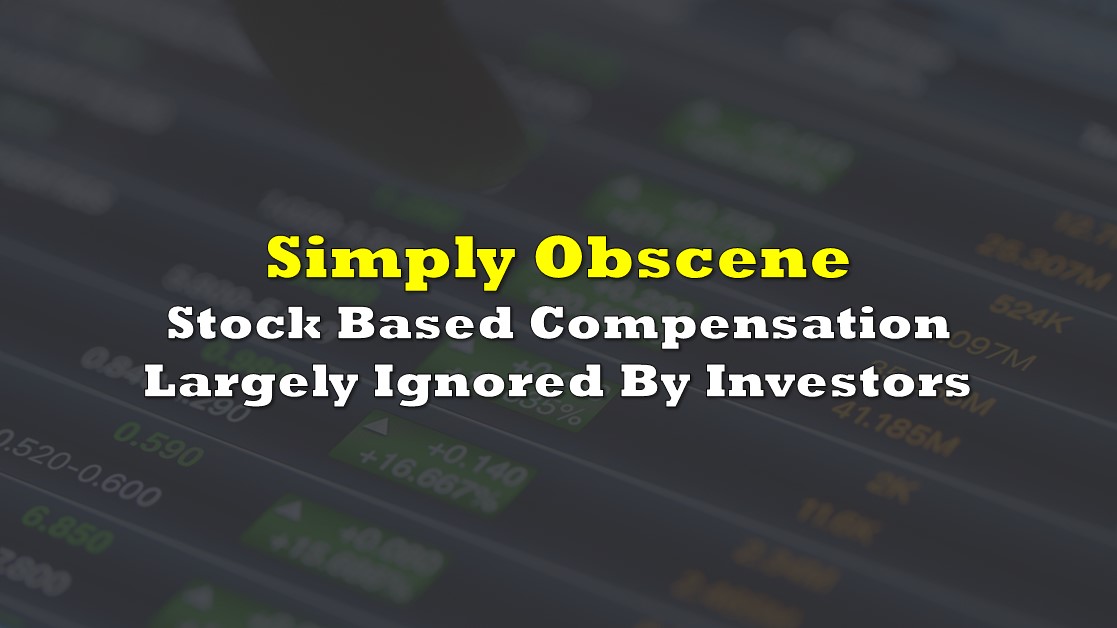As investors have decided to place an enormous premium on growth stocks over the last few years, a condition exacerbated by a seemingly desperate search for such names during the COVID-19 growth stock stay-at-home heyday of the summer of 2020 through the fall of 2021, investor concerns about valuations for “sexy” stocks have generally been pushed toward the back burner. In particular, investors are ignoring the huge amount of stock-based compensation many start-up companies are recording and handing out to employees in place of cash compensation.
High levels of stock-based compensation hurt shareholder value for a simple reason: it creates substantial dilution for investors as restricted shares or stock options are given out to management and key employees. In addition, these expenses, which reduce earnings under GAAP accounting principles, are added back to a fast-growing company’s EBITDA to create a much more attractive “adjusted EBITDA,” a widely used investment metric. Of course, adjusted EBITDA therefore reflects none of the value paid in stock or stock-linked instruments that the company feels necessary to compensate employees.
The below table lists key financial parameters of five high-valuation, early stage growth companies: the fintech players Coinbase Global, Inc. (NASDAQ: COIN) and Robinhood; Markets, Inc. (NASDAQ: HOOD); electric vehicle (EV) developers Lucid Group, Inc. (NASDAQ: LCID) and Rivian Automotive, Inc. (NASDAQ: RIVN); and Zoom Video Communications, Inc. (NASDAQ: ZM), perhaps the poster child of pandemic, stay-at-home stocks.
| (in millions of U.S. dollars) | COINBASE | ROBINHOOD | LUCID | RIVIAN | ZOOM VIDEO (A) |
| Revenue in Quarter Ended June 30, 2022 | $808.3 | $565.0 | $97.3 | $364.0 | $1,099.5 |
| Adjusted EBITDA in Quarter Ended June 30, 2022 | ($151.1) | ($80.0) | ($414.1) | ($1,305.0) | $460.9 |
| Stock-Based Compensation in Quarter Ended June 30, 2022 | $391.5 | $164.0 | $94.4 | $242.0 | $255.5 |
| as a % of Revenue | 48.4% | 29.0% | 97.0% | 66.5% | 23.2% |
| as a % of Adjusted EBITDA | NM | NM | NM | NM | 55.4% |
| Adjusted EBITDA in Quarter Ended June 30, 2022 WITHOUT Share-Based Compensation Add-Back | ($542.6) | ($244.0) | ($508.5) | ($1,547.0) | $205.3 |
| Revenue in First Half Ended June 30, 2022 | $1,974.8 | $1,087.0 | $155.0 | $459.0 | $2,173.3 |
| Adjusted EBITDA in First Half Ended June 30, 2022 | ($131.4) | ($223.0) | ($797.9) | ($2,449.0) | $929.3 |
| Stock-Based Compensation in First Half Ended June 30, 2022 | $743.6 | $384.0 | $268.9 | $559.0 | $464.9 |
| as a % of Revenue | 37.7% | 35.3% | 173.5% | 121.8% | 21.4% |
| as a % of Adjusted EBITDA | NM | NM | NM | NM | 50.0% |
| Adjusted EBITDA in First Half Ended June 30, 2022 WITHOUT Share-Based Compensation Add-Back | ($875.0) | ($607.0) | ($1,066.8) | ($3,008.0) | $464.5 |
| Revenue in Full-Year 2021 | $7,839.4 | $1,815.1 | $27.1 | $55.0 | $4,099.9 |
| Adjusted EBITDA in Full-Year 2021 | $4,090.1 | $34.0 | ($951.7) | ($2,790.0) | $1,766.3 |
| Stock-Based Compensation in Full-Year 2021 | $820.9 | $1,572.0 | $516.8 | $570.0 | $477.3 |
| as a % of Revenue | 10.5% | 86.6% | NM | NM | 11.6% |
| as a % of Adjusted EBITDA | 20.1% | NM | NM | NM | 27.0% |
| Adjusted EBITDA in Full-Year 2021 WITHOUT Share-Based Compensation Add-Back | $3,269.2 | ($1,538.0) | ($1,468.4) | ($3,360.0) | $1,289.1 |
Remarkably, in the quarter ended June 30, 2020, Lucid’s share-based compensation nearly equaled its revenue. Similar non-cash compensation distributed in 2Q 2022 by Rivian (67% of revenue) and Coinbase (48% of revenue) also seem wildly inconsistent with the current strength of each company’s business. Non-cash stock-based distributions in the quarter by Robinhood and Zoom — each representing 20% to 30% of revenue — seem more rational in comparison.
For all five companies except Zoom and perhaps Coinbase during the full year 2021 (when demand for cryptocurrencies was extremely strong throughout), the large amounts distributed as stock-based compensation appears to be almost inversely related to the cash flows of the underlying businesses. For example, Coinbase distributed US$392 million of stock-based compensation in 2Q 2022 even though its adjusted EBITDA, prior to an (unjustified) stock-based compensation add-back, was negative US$543 million.
EV maker Rivian’s share-based compensation level is even more head-scratching. Its adjusted EBITDA in 2Q 2022 before adding back the non-cash compensation element that perhaps more appropriately should have been paid in cash, was a loss of US$1.55 billion. Still, Rivian distributed US$242 million in stock-based compensation in that quarter alone.
Investors’ valuing growth names on the basis of adjusted EBITDA has become almost a reflexive action. It also follows that investors mostly dismiss high levels of ultimately dilutive stock-based compensation in their capital allocation decisions, as that non-cash compensation is frequently the largest add-back in calculating adjusted EBITDA. In our view, investors should place more emphasis on these factors when making buy-sell decisions.









